Personal and Professional Development Report: Skill Development Plan
VerifiedAdded on 2020/07/23
|15
|4281
|34
Report
AI Summary
This report delves into the realm of personal and professional development, exploring various facets of self-managed learning and skill enhancement. It begins by defining the concept of personal and professional development, highlighting different approaches to self-managed learning, such as utilizing the internet, social media, and seminars. The report emphasizes the importance of lifelong learning and its encouragement through self-directed learning and other educational avenues. It further examines the benefits of self-managed learning for both organizations and individuals, including increased employee dedication and improved confidence. The report also addresses work-based problems, offering solutions like addressing discrimination and harassment, and analyzing different communication styles. It concludes by outlining effective strategies for time management, such as setting priorities and utilizing planning tools, and it includes a self-evaluation of skills, including technological, teamwork, communication, and leadership abilities, alongside a sample CV. The report underscores the importance of continuous development and skill enhancement for achieving personal and professional goals.
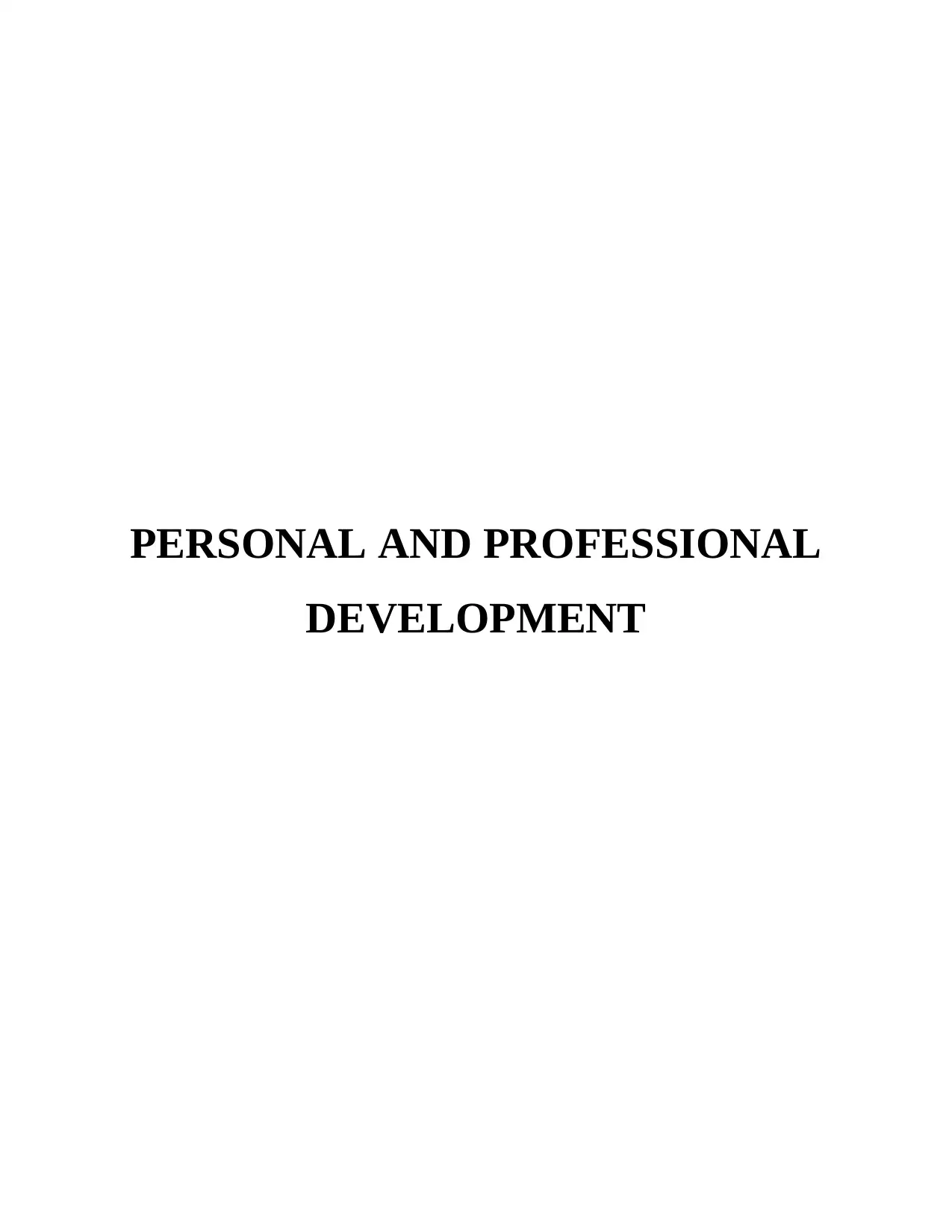
PERSONAL AND PROFESSIONAL
DEVELOPMENT
DEVELOPMENT
Paraphrase This Document
Need a fresh take? Get an instant paraphrase of this document with our AI Paraphraser
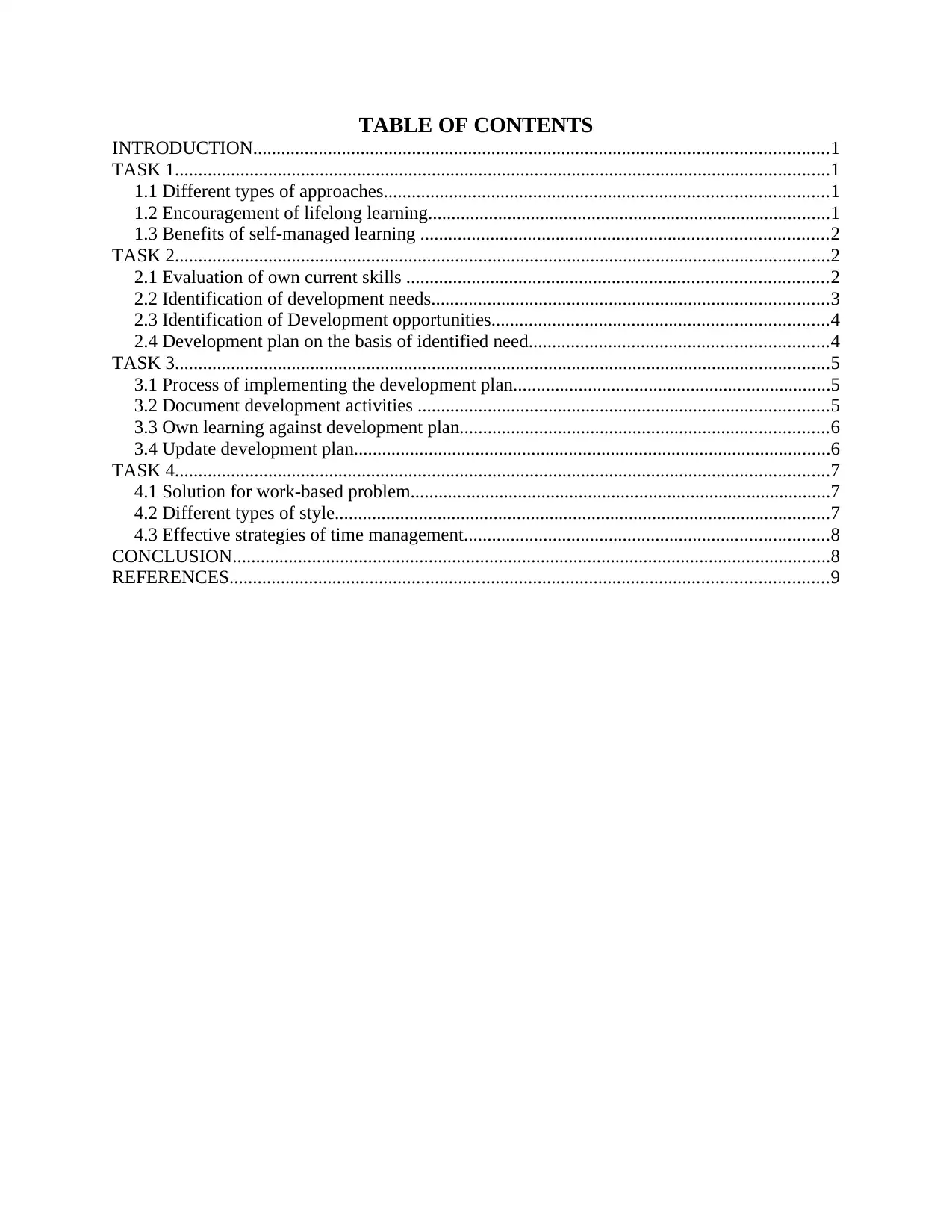
TABLE OF CONTENTS
INTRODUCTION...........................................................................................................................1
TASK 1............................................................................................................................................1
1.1 Different types of approaches...............................................................................................1
1.2 Encouragement of lifelong learning......................................................................................1
1.3 Benefits of self-managed learning .......................................................................................2
TASK 2............................................................................................................................................2
2.1 Evaluation of own current skills ..........................................................................................2
2.2 Identification of development needs.....................................................................................3
2.3 Identification of Development opportunities........................................................................4
2.4 Development plan on the basis of identified need................................................................4
TASK 3............................................................................................................................................5
3.1 Process of implementing the development plan....................................................................5
3.2 Document development activities ........................................................................................5
3.3 Own learning against development plan...............................................................................6
3.4 Update development plan......................................................................................................6
TASK 4............................................................................................................................................7
4.1 Solution for work-based problem..........................................................................................7
4.2 Different types of style..........................................................................................................7
4.3 Effective strategies of time management..............................................................................8
CONCLUSION................................................................................................................................8
REFERENCES................................................................................................................................9
INTRODUCTION...........................................................................................................................1
TASK 1............................................................................................................................................1
1.1 Different types of approaches...............................................................................................1
1.2 Encouragement of lifelong learning......................................................................................1
1.3 Benefits of self-managed learning .......................................................................................2
TASK 2............................................................................................................................................2
2.1 Evaluation of own current skills ..........................................................................................2
2.2 Identification of development needs.....................................................................................3
2.3 Identification of Development opportunities........................................................................4
2.4 Development plan on the basis of identified need................................................................4
TASK 3............................................................................................................................................5
3.1 Process of implementing the development plan....................................................................5
3.2 Document development activities ........................................................................................5
3.3 Own learning against development plan...............................................................................6
3.4 Update development plan......................................................................................................6
TASK 4............................................................................................................................................7
4.1 Solution for work-based problem..........................................................................................7
4.2 Different types of style..........................................................................................................7
4.3 Effective strategies of time management..............................................................................8
CONCLUSION................................................................................................................................8
REFERENCES................................................................................................................................9
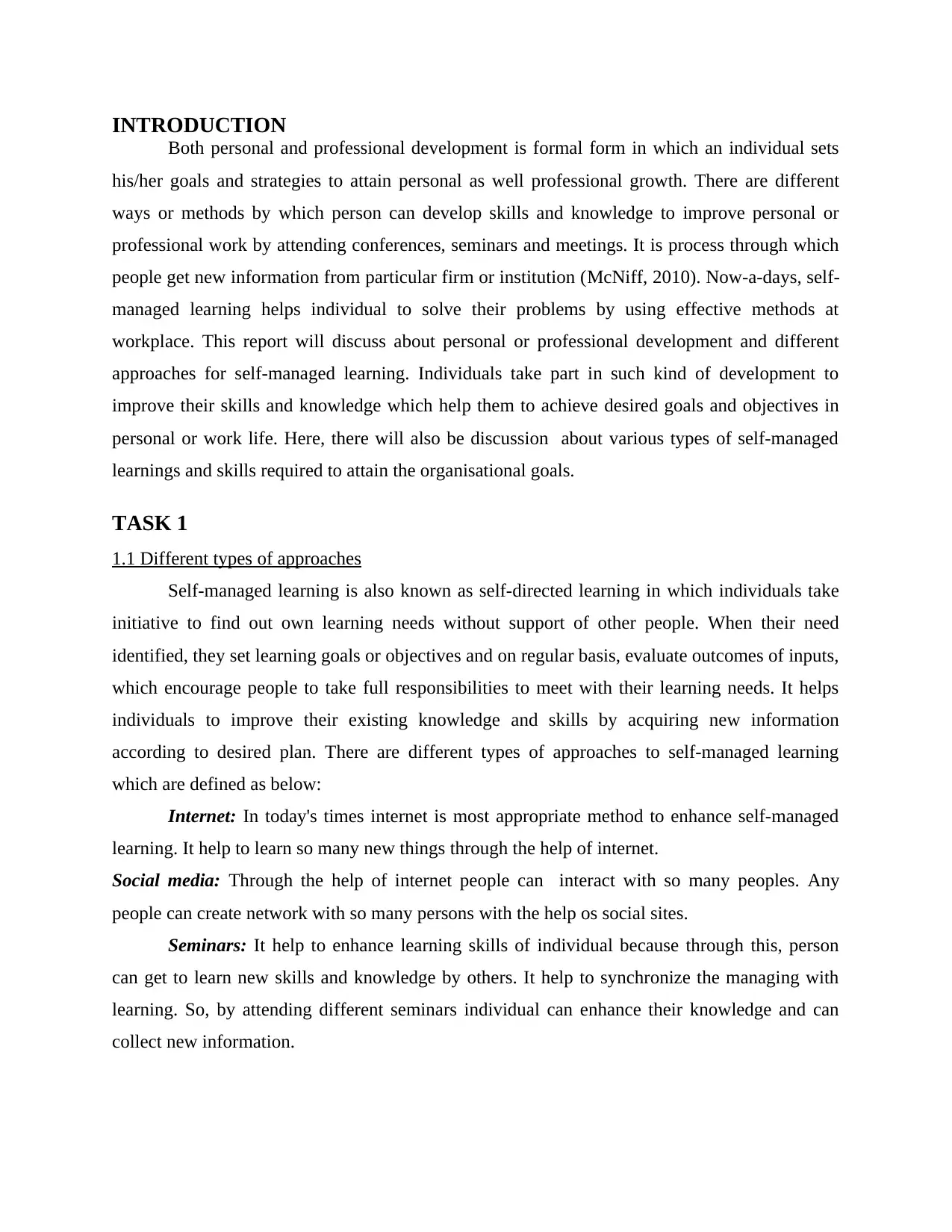
INTRODUCTION
Both personal and professional development is formal form in which an individual sets
his/her goals and strategies to attain personal as well professional growth. There are different
ways or methods by which person can develop skills and knowledge to improve personal or
professional work by attending conferences, seminars and meetings. It is process through which
people get new information from particular firm or institution (McNiff, 2010). Now-a-days, self-
managed learning helps individual to solve their problems by using effective methods at
workplace. This report will discuss about personal or professional development and different
approaches for self-managed learning. Individuals take part in such kind of development to
improve their skills and knowledge which help them to achieve desired goals and objectives in
personal or work life. Here, there will also be discussion about various types of self-managed
learnings and skills required to attain the organisational goals.
TASK 1
1.1 Different types of approaches
Self-managed learning is also known as self-directed learning in which individuals take
initiative to find out own learning needs without support of other people. When their need
identified, they set learning goals or objectives and on regular basis, evaluate outcomes of inputs,
which encourage people to take full responsibilities to meet with their learning needs. It helps
individuals to improve their existing knowledge and skills by acquiring new information
according to desired plan. There are different types of approaches to self-managed learning
which are defined as below:
Internet: In today's times internet is most appropriate method to enhance self-managed
learning. It help to learn so many new things through the help of internet.
Social media: Through the help of internet people can interact with so many peoples. Any
people can create network with so many persons with the help os social sites.
Seminars: It help to enhance learning skills of individual because through this, person
can get to learn new skills and knowledge by others. It help to synchronize the managing with
learning. So, by attending different seminars individual can enhance their knowledge and can
collect new information.
Both personal and professional development is formal form in which an individual sets
his/her goals and strategies to attain personal as well professional growth. There are different
ways or methods by which person can develop skills and knowledge to improve personal or
professional work by attending conferences, seminars and meetings. It is process through which
people get new information from particular firm or institution (McNiff, 2010). Now-a-days, self-
managed learning helps individual to solve their problems by using effective methods at
workplace. This report will discuss about personal or professional development and different
approaches for self-managed learning. Individuals take part in such kind of development to
improve their skills and knowledge which help them to achieve desired goals and objectives in
personal or work life. Here, there will also be discussion about various types of self-managed
learnings and skills required to attain the organisational goals.
TASK 1
1.1 Different types of approaches
Self-managed learning is also known as self-directed learning in which individuals take
initiative to find out own learning needs without support of other people. When their need
identified, they set learning goals or objectives and on regular basis, evaluate outcomes of inputs,
which encourage people to take full responsibilities to meet with their learning needs. It helps
individuals to improve their existing knowledge and skills by acquiring new information
according to desired plan. There are different types of approaches to self-managed learning
which are defined as below:
Internet: In today's times internet is most appropriate method to enhance self-managed
learning. It help to learn so many new things through the help of internet.
Social media: Through the help of internet people can interact with so many peoples. Any
people can create network with so many persons with the help os social sites.
Seminars: It help to enhance learning skills of individual because through this, person
can get to learn new skills and knowledge by others. It help to synchronize the managing with
learning. So, by attending different seminars individual can enhance their knowledge and can
collect new information.
⊘ This is a preview!⊘
Do you want full access?
Subscribe today to unlock all pages.

Trusted by 1+ million students worldwide
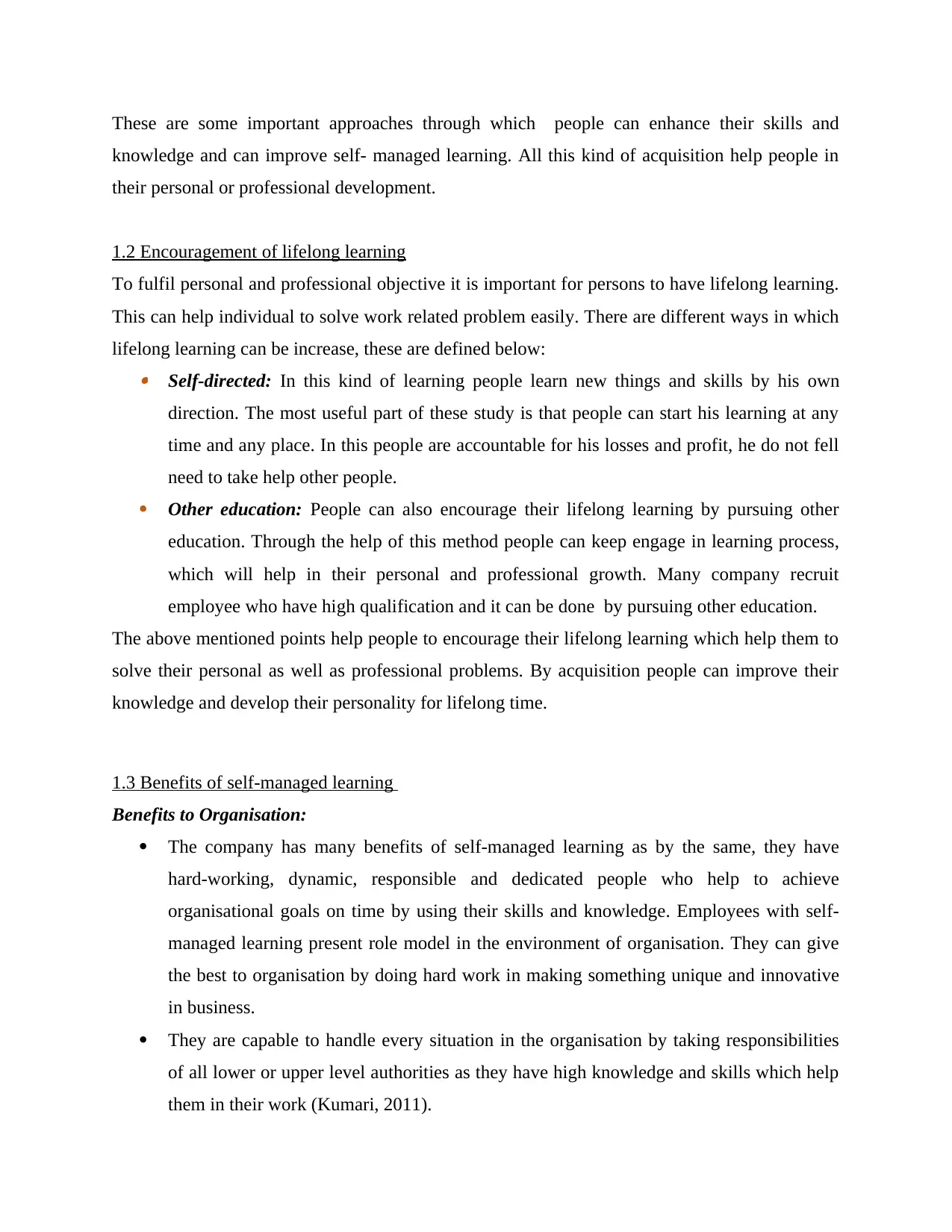
These are some important approaches through which people can enhance their skills and
knowledge and can improve self- managed learning. All this kind of acquisition help people in
their personal or professional development.
1.2 Encouragement of lifelong learning
To fulfil personal and professional objective it is important for persons to have lifelong learning.
This can help individual to solve work related problem easily. There are different ways in which
lifelong learning can be increase, these are defined below: Self-directed: In this kind of learning people learn new things and skills by his own
direction. The most useful part of these study is that people can start his learning at any
time and any place. In this people are accountable for his losses and profit, he do not fell
need to take help other people.
Other education: People can also encourage their lifelong learning by pursuing other
education. Through the help of this method people can keep engage in learning process,
which will help in their personal and professional growth. Many company recruit
employee who have high qualification and it can be done by pursuing other education.
The above mentioned points help people to encourage their lifelong learning which help them to
solve their personal as well as professional problems. By acquisition people can improve their
knowledge and develop their personality for lifelong time.
1.3 Benefits of self-managed learning
Benefits to Organisation:
The company has many benefits of self-managed learning as by the same, they have
hard-working, dynamic, responsible and dedicated people who help to achieve
organisational goals on time by using their skills and knowledge. Employees with self-
managed learning present role model in the environment of organisation. They can give
the best to organisation by doing hard work in making something unique and innovative
in business.
They are capable to handle every situation in the organisation by taking responsibilities
of all lower or upper level authorities as they have high knowledge and skills which help
them in their work (Kumari, 2011).
knowledge and can improve self- managed learning. All this kind of acquisition help people in
their personal or professional development.
1.2 Encouragement of lifelong learning
To fulfil personal and professional objective it is important for persons to have lifelong learning.
This can help individual to solve work related problem easily. There are different ways in which
lifelong learning can be increase, these are defined below: Self-directed: In this kind of learning people learn new things and skills by his own
direction. The most useful part of these study is that people can start his learning at any
time and any place. In this people are accountable for his losses and profit, he do not fell
need to take help other people.
Other education: People can also encourage their lifelong learning by pursuing other
education. Through the help of this method people can keep engage in learning process,
which will help in their personal and professional growth. Many company recruit
employee who have high qualification and it can be done by pursuing other education.
The above mentioned points help people to encourage their lifelong learning which help them to
solve their personal as well as professional problems. By acquisition people can improve their
knowledge and develop their personality for lifelong time.
1.3 Benefits of self-managed learning
Benefits to Organisation:
The company has many benefits of self-managed learning as by the same, they have
hard-working, dynamic, responsible and dedicated people who help to achieve
organisational goals on time by using their skills and knowledge. Employees with self-
managed learning present role model in the environment of organisation. They can give
the best to organisation by doing hard work in making something unique and innovative
in business.
They are capable to handle every situation in the organisation by taking responsibilities
of all lower or upper level authorities as they have high knowledge and skills which help
them in their work (Kumari, 2011).
Paraphrase This Document
Need a fresh take? Get an instant paraphrase of this document with our AI Paraphraser
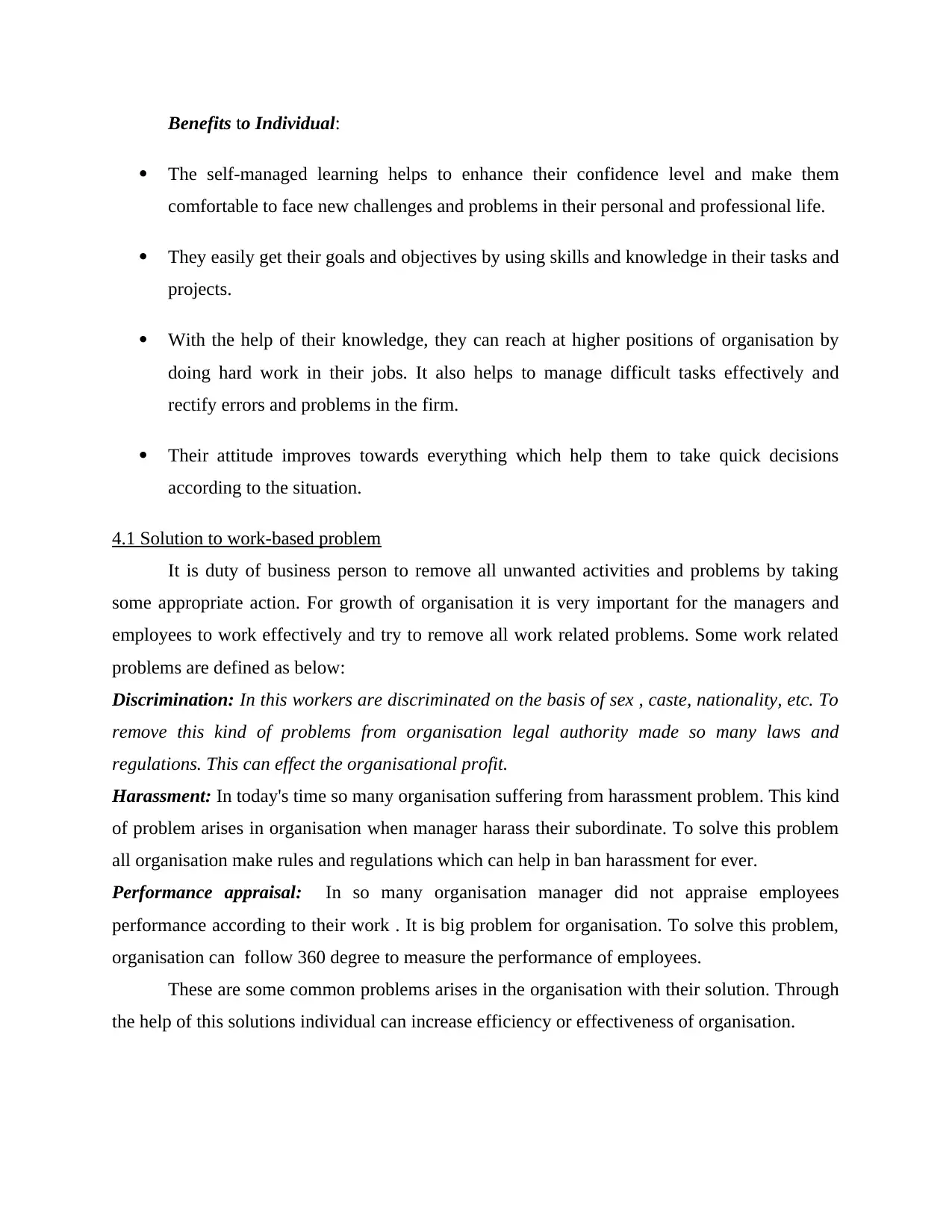
Benefits to Individual:
The self-managed learning helps to enhance their confidence level and make them
comfortable to face new challenges and problems in their personal and professional life.
They easily get their goals and objectives by using skills and knowledge in their tasks and
projects.
With the help of their knowledge, they can reach at higher positions of organisation by
doing hard work in their jobs. It also helps to manage difficult tasks effectively and
rectify errors and problems in the firm.
Their attitude improves towards everything which help them to take quick decisions
according to the situation.
4.1 Solution to work-based problem
It is duty of business person to remove all unwanted activities and problems by taking
some appropriate action. For growth of organisation it is very important for the managers and
employees to work effectively and try to remove all work related problems. Some work related
problems are defined as below:
Discrimination: In this workers are discriminated on the basis of sex , caste, nationality, etc. To
remove this kind of problems from organisation legal authority made so many laws and
regulations. This can effect the organisational profit.
Harassment: In today's time so many organisation suffering from harassment problem. This kind
of problem arises in organisation when manager harass their subordinate. To solve this problem
all organisation make rules and regulations which can help in ban harassment for ever.
Performance appraisal: In so many organisation manager did not appraise employees
performance according to their work . It is big problem for organisation. To solve this problem,
organisation can follow 360 degree to measure the performance of employees.
These are some common problems arises in the organisation with their solution. Through
the help of this solutions individual can increase efficiency or effectiveness of organisation.
The self-managed learning helps to enhance their confidence level and make them
comfortable to face new challenges and problems in their personal and professional life.
They easily get their goals and objectives by using skills and knowledge in their tasks and
projects.
With the help of their knowledge, they can reach at higher positions of organisation by
doing hard work in their jobs. It also helps to manage difficult tasks effectively and
rectify errors and problems in the firm.
Their attitude improves towards everything which help them to take quick decisions
according to the situation.
4.1 Solution to work-based problem
It is duty of business person to remove all unwanted activities and problems by taking
some appropriate action. For growth of organisation it is very important for the managers and
employees to work effectively and try to remove all work related problems. Some work related
problems are defined as below:
Discrimination: In this workers are discriminated on the basis of sex , caste, nationality, etc. To
remove this kind of problems from organisation legal authority made so many laws and
regulations. This can effect the organisational profit.
Harassment: In today's time so many organisation suffering from harassment problem. This kind
of problem arises in organisation when manager harass their subordinate. To solve this problem
all organisation make rules and regulations which can help in ban harassment for ever.
Performance appraisal: In so many organisation manager did not appraise employees
performance according to their work . It is big problem for organisation. To solve this problem,
organisation can follow 360 degree to measure the performance of employees.
These are some common problems arises in the organisation with their solution. Through
the help of this solutions individual can increase efficiency or effectiveness of organisation.
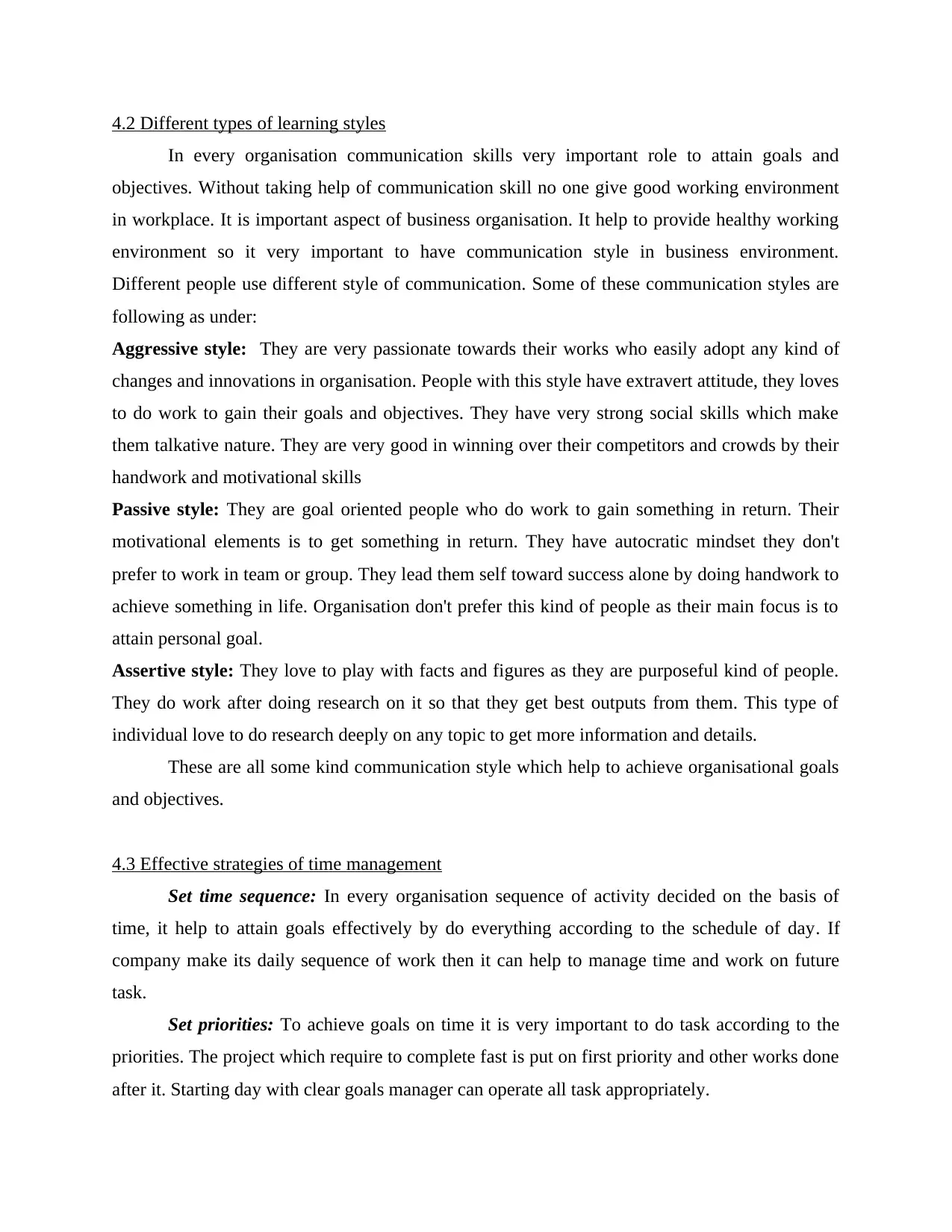
4.2 Different types of learning styles
In every organisation communication skills very important role to attain goals and
objectives. Without taking help of communication skill no one give good working environment
in workplace. It is important aspect of business organisation. It help to provide healthy working
environment so it very important to have communication style in business environment.
Different people use different style of communication. Some of these communication styles are
following as under:
Aggressive style: They are very passionate towards their works who easily adopt any kind of
changes and innovations in organisation. People with this style have extravert attitude, they loves
to do work to gain their goals and objectives. They have very strong social skills which make
them talkative nature. They are very good in winning over their competitors and crowds by their
handwork and motivational skills
Passive style: They are goal oriented people who do work to gain something in return. Their
motivational elements is to get something in return. They have autocratic mindset they don't
prefer to work in team or group. They lead them self toward success alone by doing handwork to
achieve something in life. Organisation don't prefer this kind of people as their main focus is to
attain personal goal.
Assertive style: They love to play with facts and figures as they are purposeful kind of people.
They do work after doing research on it so that they get best outputs from them. This type of
individual love to do research deeply on any topic to get more information and details.
These are all some kind communication style which help to achieve organisational goals
and objectives.
4.3 Effective strategies of time management
Set time sequence: In every organisation sequence of activity decided on the basis of
time, it help to attain goals effectively by do everything according to the schedule of day. If
company make its daily sequence of work then it can help to manage time and work on future
task.
Set priorities: To achieve goals on time it is very important to do task according to the
priorities. The project which require to complete fast is put on first priority and other works done
after it. Starting day with clear goals manager can operate all task appropriately.
In every organisation communication skills very important role to attain goals and
objectives. Without taking help of communication skill no one give good working environment
in workplace. It is important aspect of business organisation. It help to provide healthy working
environment so it very important to have communication style in business environment.
Different people use different style of communication. Some of these communication styles are
following as under:
Aggressive style: They are very passionate towards their works who easily adopt any kind of
changes and innovations in organisation. People with this style have extravert attitude, they loves
to do work to gain their goals and objectives. They have very strong social skills which make
them talkative nature. They are very good in winning over their competitors and crowds by their
handwork and motivational skills
Passive style: They are goal oriented people who do work to gain something in return. Their
motivational elements is to get something in return. They have autocratic mindset they don't
prefer to work in team or group. They lead them self toward success alone by doing handwork to
achieve something in life. Organisation don't prefer this kind of people as their main focus is to
attain personal goal.
Assertive style: They love to play with facts and figures as they are purposeful kind of people.
They do work after doing research on it so that they get best outputs from them. This type of
individual love to do research deeply on any topic to get more information and details.
These are all some kind communication style which help to achieve organisational goals
and objectives.
4.3 Effective strategies of time management
Set time sequence: In every organisation sequence of activity decided on the basis of
time, it help to attain goals effectively by do everything according to the schedule of day. If
company make its daily sequence of work then it can help to manage time and work on future
task.
Set priorities: To achieve goals on time it is very important to do task according to the
priorities. The project which require to complete fast is put on first priority and other works done
after it. Starting day with clear goals manager can operate all task appropriately.
⊘ This is a preview!⊘
Do you want full access?
Subscribe today to unlock all pages.

Trusted by 1+ million students worldwide
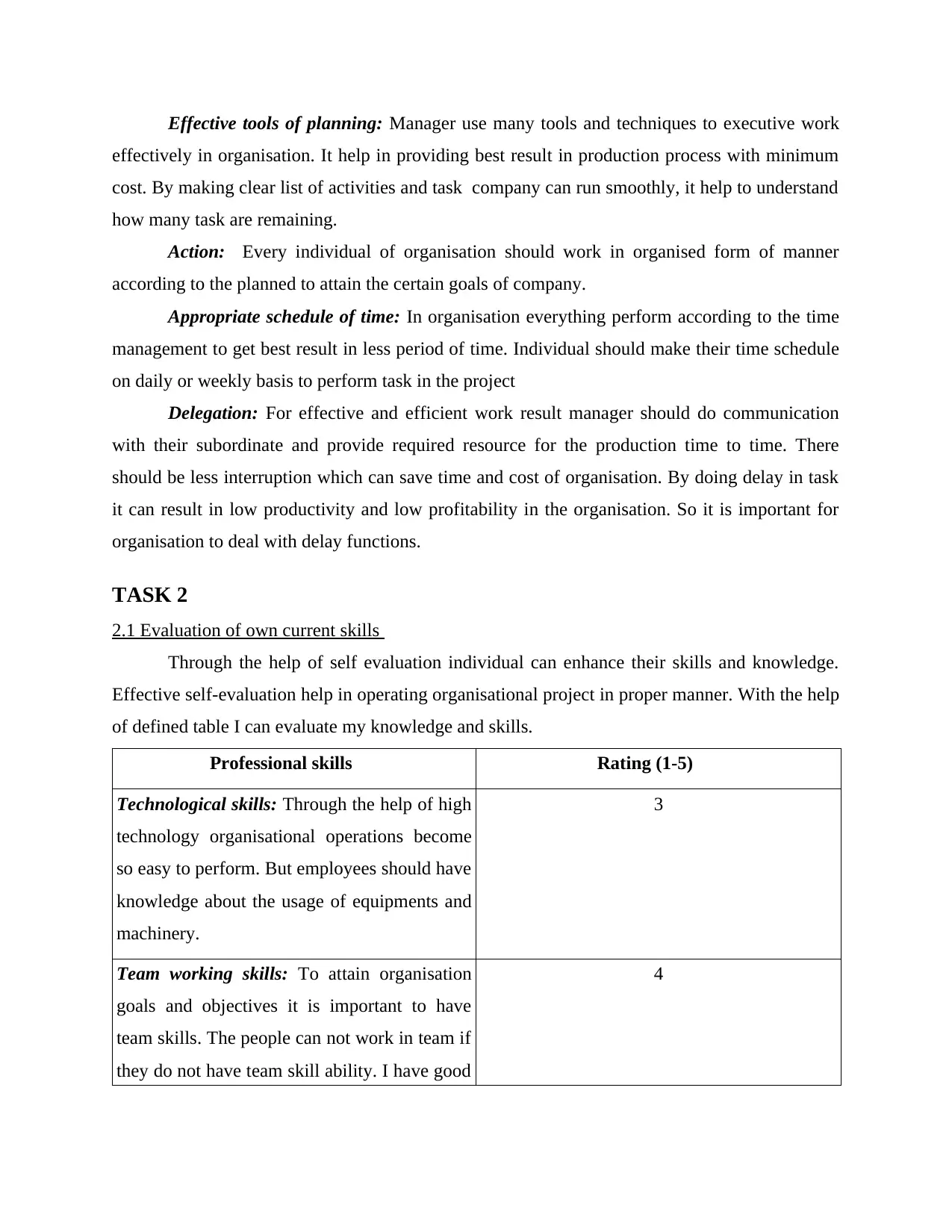
Effective tools of planning: Manager use many tools and techniques to executive work
effectively in organisation. It help in providing best result in production process with minimum
cost. By making clear list of activities and task company can run smoothly, it help to understand
how many task are remaining.
Action: Every individual of organisation should work in organised form of manner
according to the planned to attain the certain goals of company.
Appropriate schedule of time: In organisation everything perform according to the time
management to get best result in less period of time. Individual should make their time schedule
on daily or weekly basis to perform task in the project
Delegation: For effective and efficient work result manager should do communication
with their subordinate and provide required resource for the production time to time. There
should be less interruption which can save time and cost of organisation. By doing delay in task
it can result in low productivity and low profitability in the organisation. So it is important for
organisation to deal with delay functions.
TASK 2
2.1 Evaluation of own current skills
Through the help of self evaluation individual can enhance their skills and knowledge.
Effective self-evaluation help in operating organisational project in proper manner. With the help
of defined table I can evaluate my knowledge and skills.
Professional skills Rating (1-5)
Technological skills: Through the help of high
technology organisational operations become
so easy to perform. But employees should have
knowledge about the usage of equipments and
machinery.
3
Team working skills: To attain organisation
goals and objectives it is important to have
team skills. The people can not work in team if
they do not have team skill ability. I have good
4
effectively in organisation. It help in providing best result in production process with minimum
cost. By making clear list of activities and task company can run smoothly, it help to understand
how many task are remaining.
Action: Every individual of organisation should work in organised form of manner
according to the planned to attain the certain goals of company.
Appropriate schedule of time: In organisation everything perform according to the time
management to get best result in less period of time. Individual should make their time schedule
on daily or weekly basis to perform task in the project
Delegation: For effective and efficient work result manager should do communication
with their subordinate and provide required resource for the production time to time. There
should be less interruption which can save time and cost of organisation. By doing delay in task
it can result in low productivity and low profitability in the organisation. So it is important for
organisation to deal with delay functions.
TASK 2
2.1 Evaluation of own current skills
Through the help of self evaluation individual can enhance their skills and knowledge.
Effective self-evaluation help in operating organisational project in proper manner. With the help
of defined table I can evaluate my knowledge and skills.
Professional skills Rating (1-5)
Technological skills: Through the help of high
technology organisational operations become
so easy to perform. But employees should have
knowledge about the usage of equipments and
machinery.
3
Team working skills: To attain organisation
goals and objectives it is important to have
team skills. The people can not work in team if
they do not have team skill ability. I have good
4
Paraphrase This Document
Need a fresh take? Get an instant paraphrase of this document with our AI Paraphraser
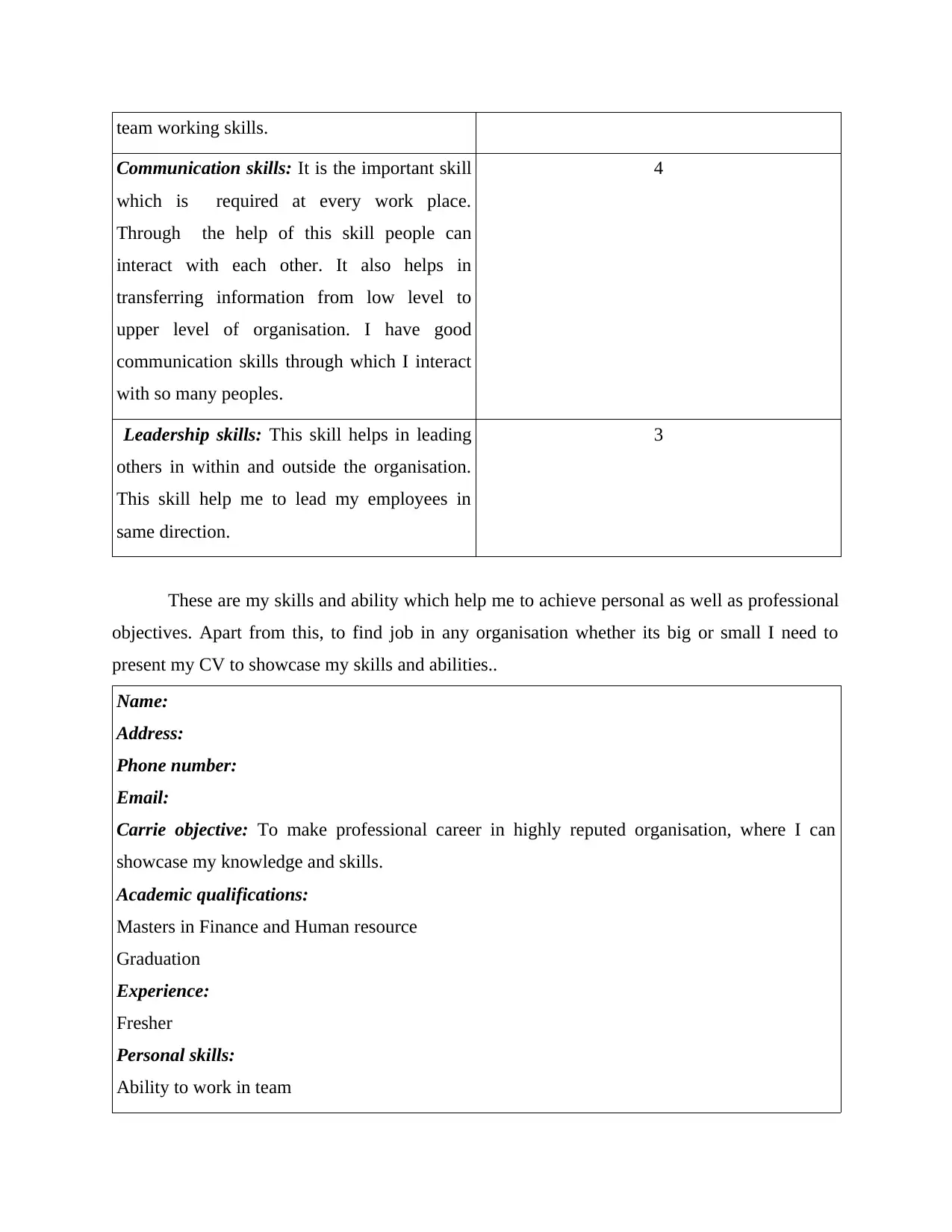
team working skills.
Communication skills: It is the important skill
which is required at every work place.
Through the help of this skill people can
interact with each other. It also helps in
transferring information from low level to
upper level of organisation. I have good
communication skills through which I interact
with so many peoples.
4
Leadership skills: This skill helps in leading
others in within and outside the organisation.
This skill help me to lead my employees in
same direction.
3
These are my skills and ability which help me to achieve personal as well as professional
objectives. Apart from this, to find job in any organisation whether its big or small I need to
present my CV to showcase my skills and abilities..
Name:
Address:
Phone number:
Email:
Carrie objective: To make professional career in highly reputed organisation, where I can
showcase my knowledge and skills.
Academic qualifications:
Masters in Finance and Human resource
Graduation
Experience:
Fresher
Personal skills:
Ability to work in team
Communication skills: It is the important skill
which is required at every work place.
Through the help of this skill people can
interact with each other. It also helps in
transferring information from low level to
upper level of organisation. I have good
communication skills through which I interact
with so many peoples.
4
Leadership skills: This skill helps in leading
others in within and outside the organisation.
This skill help me to lead my employees in
same direction.
3
These are my skills and ability which help me to achieve personal as well as professional
objectives. Apart from this, to find job in any organisation whether its big or small I need to
present my CV to showcase my skills and abilities..
Name:
Address:
Phone number:
Email:
Carrie objective: To make professional career in highly reputed organisation, where I can
showcase my knowledge and skills.
Academic qualifications:
Masters in Finance and Human resource
Graduation
Experience:
Fresher
Personal skills:
Ability to work in team
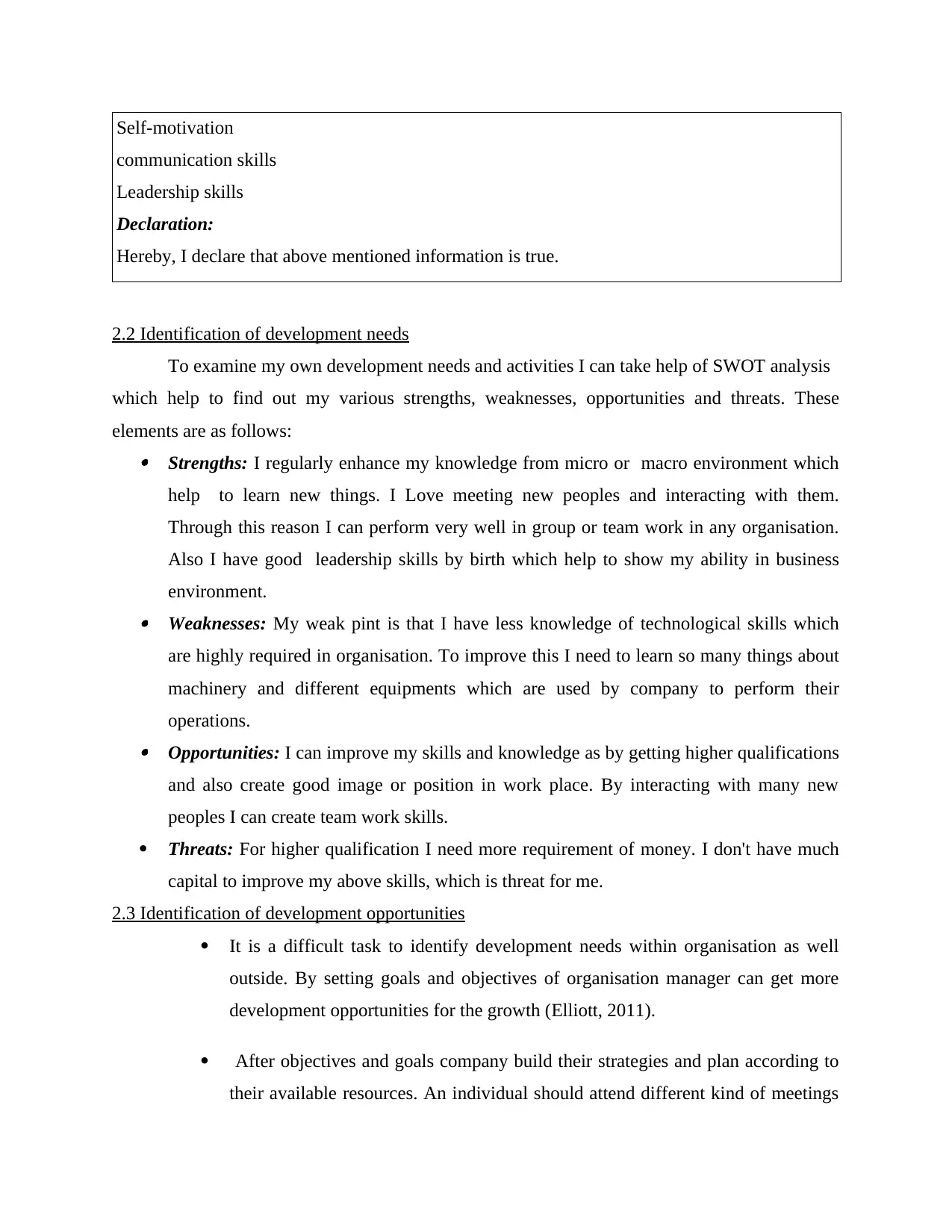
Self-motivation
communication skills
Leadership skills
Declaration:
Hereby, I declare that above mentioned information is true.
2.2 Identification of development needs
To examine my own development needs and activities I can take help of SWOT analysis
which help to find out my various strengths, weaknesses, opportunities and threats. These
elements are as follows: Strengths: I regularly enhance my knowledge from micro or macro environment which
help to learn new things. I Love meeting new peoples and interacting with them.
Through this reason I can perform very well in group or team work in any organisation.
Also I have good leadership skills by birth which help to show my ability in business
environment. Weaknesses: My weak pint is that I have less knowledge of technological skills which
are highly required in organisation. To improve this I need to learn so many things about
machinery and different equipments which are used by company to perform their
operations. Opportunities: I can improve my skills and knowledge as by getting higher qualifications
and also create good image or position in work place. By interacting with many new
peoples I can create team work skills.
Threats: For higher qualification I need more requirement of money. I don't have much
capital to improve my above skills, which is threat for me.
2.3 Identification of development opportunities
It is a difficult task to identify development needs within organisation as well
outside. By setting goals and objectives of organisation manager can get more
development opportunities for the growth (Elliott, 2011).
After objectives and goals company build their strategies and plan according to
their available resources. An individual should attend different kind of meetings
communication skills
Leadership skills
Declaration:
Hereby, I declare that above mentioned information is true.
2.2 Identification of development needs
To examine my own development needs and activities I can take help of SWOT analysis
which help to find out my various strengths, weaknesses, opportunities and threats. These
elements are as follows: Strengths: I regularly enhance my knowledge from micro or macro environment which
help to learn new things. I Love meeting new peoples and interacting with them.
Through this reason I can perform very well in group or team work in any organisation.
Also I have good leadership skills by birth which help to show my ability in business
environment. Weaknesses: My weak pint is that I have less knowledge of technological skills which
are highly required in organisation. To improve this I need to learn so many things about
machinery and different equipments which are used by company to perform their
operations. Opportunities: I can improve my skills and knowledge as by getting higher qualifications
and also create good image or position in work place. By interacting with many new
peoples I can create team work skills.
Threats: For higher qualification I need more requirement of money. I don't have much
capital to improve my above skills, which is threat for me.
2.3 Identification of development opportunities
It is a difficult task to identify development needs within organisation as well
outside. By setting goals and objectives of organisation manager can get more
development opportunities for the growth (Elliott, 2011).
After objectives and goals company build their strategies and plan according to
their available resources. An individual should attend different kind of meetings
⊘ This is a preview!⊘
Do you want full access?
Subscribe today to unlock all pages.

Trusted by 1+ million students worldwide
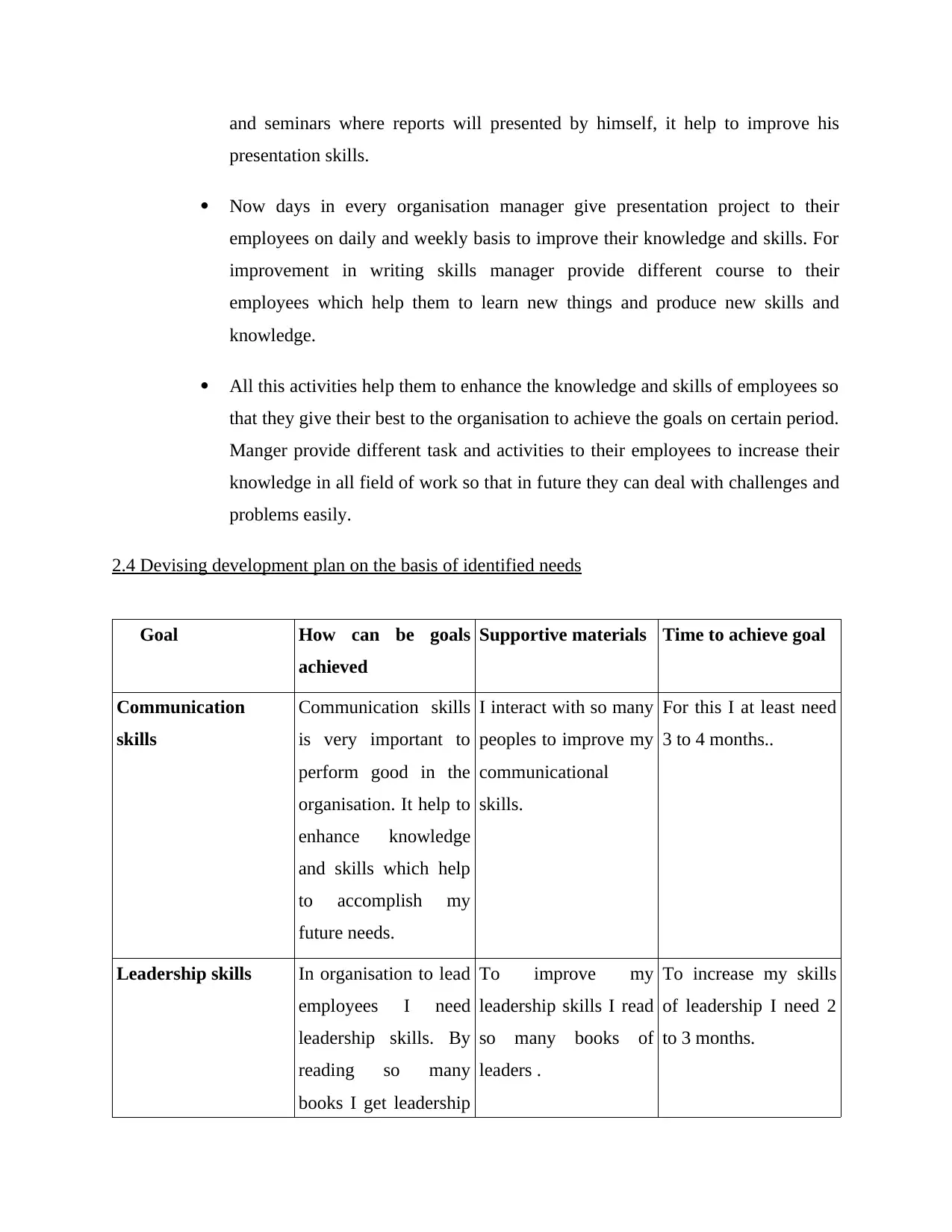
and seminars where reports will presented by himself, it help to improve his
presentation skills.
Now days in every organisation manager give presentation project to their
employees on daily and weekly basis to improve their knowledge and skills. For
improvement in writing skills manager provide different course to their
employees which help them to learn new things and produce new skills and
knowledge.
All this activities help them to enhance the knowledge and skills of employees so
that they give their best to the organisation to achieve the goals on certain period.
Manger provide different task and activities to their employees to increase their
knowledge in all field of work so that in future they can deal with challenges and
problems easily.
2.4 Devising development plan on the basis of identified needs
Goal How can be goals
achieved
Supportive materials Time to achieve goal
Communication
skills
Communication skills
is very important to
perform good in the
organisation. It help to
enhance knowledge
and skills which help
to accomplish my
future needs.
I interact with so many
peoples to improve my
communicational
skills.
For this I at least need
3 to 4 months..
Leadership skills In organisation to lead
employees I need
leadership skills. By
reading so many
books I get leadership
To improve my
leadership skills I read
so many books of
leaders .
To increase my skills
of leadership I need 2
to 3 months.
presentation skills.
Now days in every organisation manager give presentation project to their
employees on daily and weekly basis to improve their knowledge and skills. For
improvement in writing skills manager provide different course to their
employees which help them to learn new things and produce new skills and
knowledge.
All this activities help them to enhance the knowledge and skills of employees so
that they give their best to the organisation to achieve the goals on certain period.
Manger provide different task and activities to their employees to increase their
knowledge in all field of work so that in future they can deal with challenges and
problems easily.
2.4 Devising development plan on the basis of identified needs
Goal How can be goals
achieved
Supportive materials Time to achieve goal
Communication
skills
Communication skills
is very important to
perform good in the
organisation. It help to
enhance knowledge
and skills which help
to accomplish my
future needs.
I interact with so many
peoples to improve my
communicational
skills.
For this I at least need
3 to 4 months..
Leadership skills In organisation to lead
employees I need
leadership skills. By
reading so many
books I get leadership
To improve my
leadership skills I read
so many books of
leaders .
To increase my skills
of leadership I need 2
to 3 months.
Paraphrase This Document
Need a fresh take? Get an instant paraphrase of this document with our AI Paraphraser
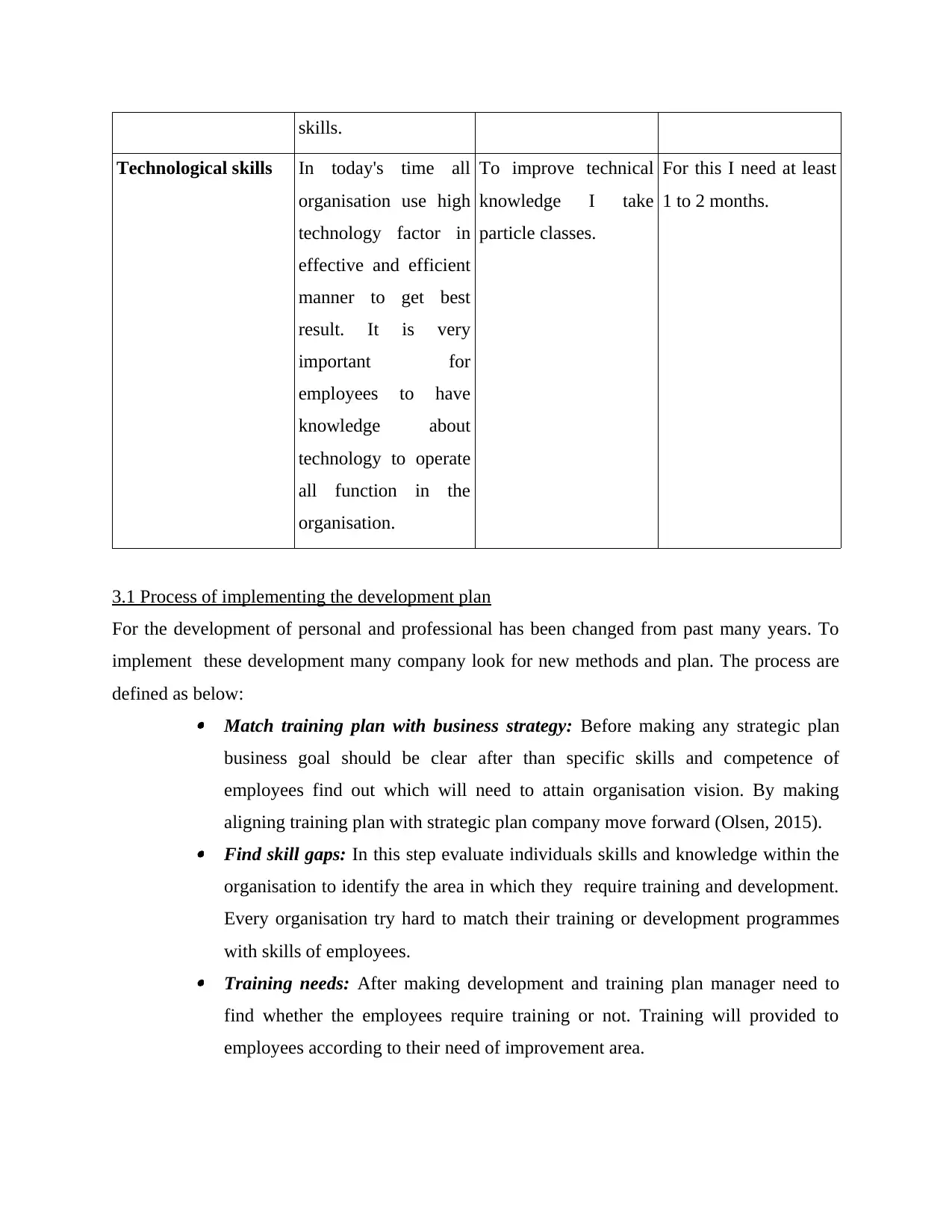
skills.
Technological skills In today's time all
organisation use high
technology factor in
effective and efficient
manner to get best
result. It is very
important for
employees to have
knowledge about
technology to operate
all function in the
organisation.
To improve technical
knowledge I take
particle classes.
For this I need at least
1 to 2 months.
3.1 Process of implementing the development plan
For the development of personal and professional has been changed from past many years. To
implement these development many company look for new methods and plan. The process are
defined as below:
Match training plan with business strategy: Before making any strategic plan
business goal should be clear after than specific skills and competence of
employees find out which will need to attain organisation vision. By making
aligning training plan with strategic plan company move forward (Olsen, 2015).
Find skill gaps: In this step evaluate individuals skills and knowledge within the
organisation to identify the area in which they require training and development.
Every organisation try hard to match their training or development programmes
with skills of employees.
Training needs: After making development and training plan manager need to
find whether the employees require training or not. Training will provided to
employees according to their need of improvement area.
Technological skills In today's time all
organisation use high
technology factor in
effective and efficient
manner to get best
result. It is very
important for
employees to have
knowledge about
technology to operate
all function in the
organisation.
To improve technical
knowledge I take
particle classes.
For this I need at least
1 to 2 months.
3.1 Process of implementing the development plan
For the development of personal and professional has been changed from past many years. To
implement these development many company look for new methods and plan. The process are
defined as below:
Match training plan with business strategy: Before making any strategic plan
business goal should be clear after than specific skills and competence of
employees find out which will need to attain organisation vision. By making
aligning training plan with strategic plan company move forward (Olsen, 2015).
Find skill gaps: In this step evaluate individuals skills and knowledge within the
organisation to identify the area in which they require training and development.
Every organisation try hard to match their training or development programmes
with skills of employees.
Training needs: After making development and training plan manager need to
find whether the employees require training or not. Training will provided to
employees according to their need of improvement area.
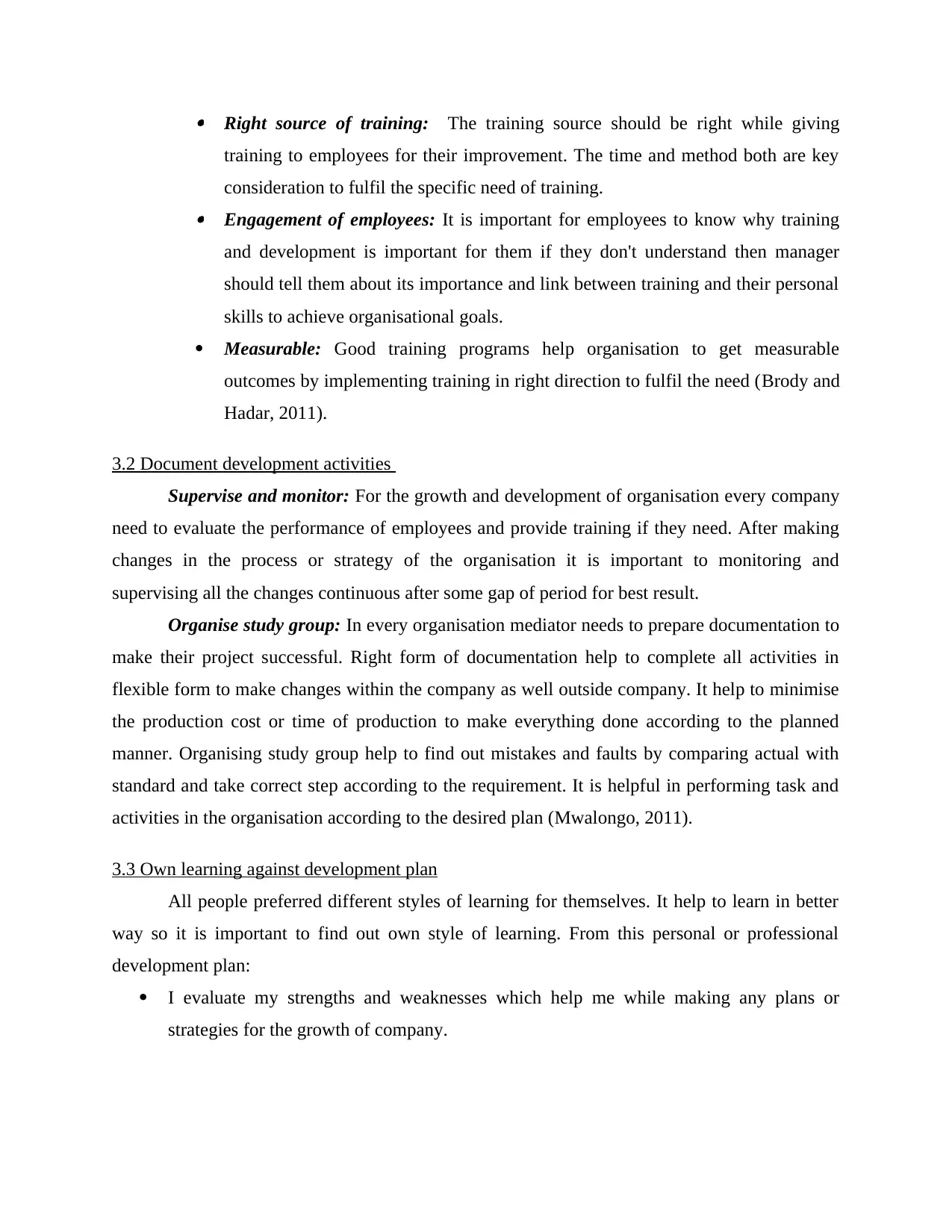
Right source of training: The training source should be right while giving
training to employees for their improvement. The time and method both are key
consideration to fulfil the specific need of training.
Engagement of employees: It is important for employees to know why training
and development is important for them if they don't understand then manager
should tell them about its importance and link between training and their personal
skills to achieve organisational goals.
Measurable: Good training programs help organisation to get measurable
outcomes by implementing training in right direction to fulfil the need (Brody and
Hadar, 2011).
3.2 Document development activities
Supervise and monitor: For the growth and development of organisation every company
need to evaluate the performance of employees and provide training if they need. After making
changes in the process or strategy of the organisation it is important to monitoring and
supervising all the changes continuous after some gap of period for best result.
Organise study group: In every organisation mediator needs to prepare documentation to
make their project successful. Right form of documentation help to complete all activities in
flexible form to make changes within the company as well outside company. It help to minimise
the production cost or time of production to make everything done according to the planned
manner. Organising study group help to find out mistakes and faults by comparing actual with
standard and take correct step according to the requirement. It is helpful in performing task and
activities in the organisation according to the desired plan (Mwalongo, 2011).
3.3 Own learning against development plan
All people preferred different styles of learning for themselves. It help to learn in better
way so it is important to find out own style of learning. From this personal or professional
development plan:
I evaluate my strengths and weaknesses which help me while making any plans or
strategies for the growth of company.
training to employees for their improvement. The time and method both are key
consideration to fulfil the specific need of training.
Engagement of employees: It is important for employees to know why training
and development is important for them if they don't understand then manager
should tell them about its importance and link between training and their personal
skills to achieve organisational goals.
Measurable: Good training programs help organisation to get measurable
outcomes by implementing training in right direction to fulfil the need (Brody and
Hadar, 2011).
3.2 Document development activities
Supervise and monitor: For the growth and development of organisation every company
need to evaluate the performance of employees and provide training if they need. After making
changes in the process or strategy of the organisation it is important to monitoring and
supervising all the changes continuous after some gap of period for best result.
Organise study group: In every organisation mediator needs to prepare documentation to
make their project successful. Right form of documentation help to complete all activities in
flexible form to make changes within the company as well outside company. It help to minimise
the production cost or time of production to make everything done according to the planned
manner. Organising study group help to find out mistakes and faults by comparing actual with
standard and take correct step according to the requirement. It is helpful in performing task and
activities in the organisation according to the desired plan (Mwalongo, 2011).
3.3 Own learning against development plan
All people preferred different styles of learning for themselves. It help to learn in better
way so it is important to find out own style of learning. From this personal or professional
development plan:
I evaluate my strengths and weaknesses which help me while making any plans or
strategies for the growth of company.
⊘ This is a preview!⊘
Do you want full access?
Subscribe today to unlock all pages.

Trusted by 1+ million students worldwide
1 out of 15
Related Documents
Your All-in-One AI-Powered Toolkit for Academic Success.
+13062052269
info@desklib.com
Available 24*7 on WhatsApp / Email
![[object Object]](/_next/static/media/star-bottom.7253800d.svg)
Unlock your academic potential
Copyright © 2020–2026 A2Z Services. All Rights Reserved. Developed and managed by ZUCOL.




